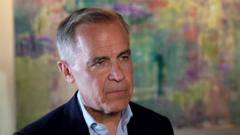In a recent interview, Finnish President Alexander Stubb expressed strong views against “Finlandization” for Ukraine, urging the need for autonomy in peace negotiations with Russia, while actively engaging with key international figures.
### Finland's Stance on Ukraine: Insights from President Alexander Stubb

### Finland's Stance on Ukraine: Insights from President Alexander Stubb
**President Stubb emphasizes the importance of Ukrainian sovereignty amid ongoing conflict.**
In the serene city of Hameenlinna, Finnish President Alexander Stubb shared insights on the Ukraine conflict, advocating for the country's autonomy in peace negotiations with Russia. Having recently golfed with President Trump, Stubb's diplomatic efforts underline Finland's unique understanding of Ukraine's predicament, inherited from its own past with Russia. Concerned about the concept of “Finlandization,” where Ukraine might face pressure to cede parts of its sovereignty, Stubb stressed the importance of maintaining national independence while seeking peace.
In the 1940s, Finland was compelled to make substantial concessions to Moscow, a situation that Stubb argues must be avoided for Ukraine. He highlighted the detrimental long-term effects of ceding autonomy, stating, "I would never bestow upon another state the predicament of a larger player determining some of the key elements of who you are as a country." Stubb’s vision for Ukraine is one of resilience and sovereignty, avoiding the restricted existence Finland endured for decades under similar circumstances.
With ongoing dialogues involving global leaders, Stubb is positioning himself as a key figure in advocating for a peaceful resolution that respects Ukraine’s rights and independence. As the conflict evolves, the Finnish President’s insights offer a critical lens on how history could inform future peace agreements in this turbulent time.
In the 1940s, Finland was compelled to make substantial concessions to Moscow, a situation that Stubb argues must be avoided for Ukraine. He highlighted the detrimental long-term effects of ceding autonomy, stating, "I would never bestow upon another state the predicament of a larger player determining some of the key elements of who you are as a country." Stubb’s vision for Ukraine is one of resilience and sovereignty, avoiding the restricted existence Finland endured for decades under similar circumstances.
With ongoing dialogues involving global leaders, Stubb is positioning himself as a key figure in advocating for a peaceful resolution that respects Ukraine’s rights and independence. As the conflict evolves, the Finnish President’s insights offer a critical lens on how history could inform future peace agreements in this turbulent time.






















